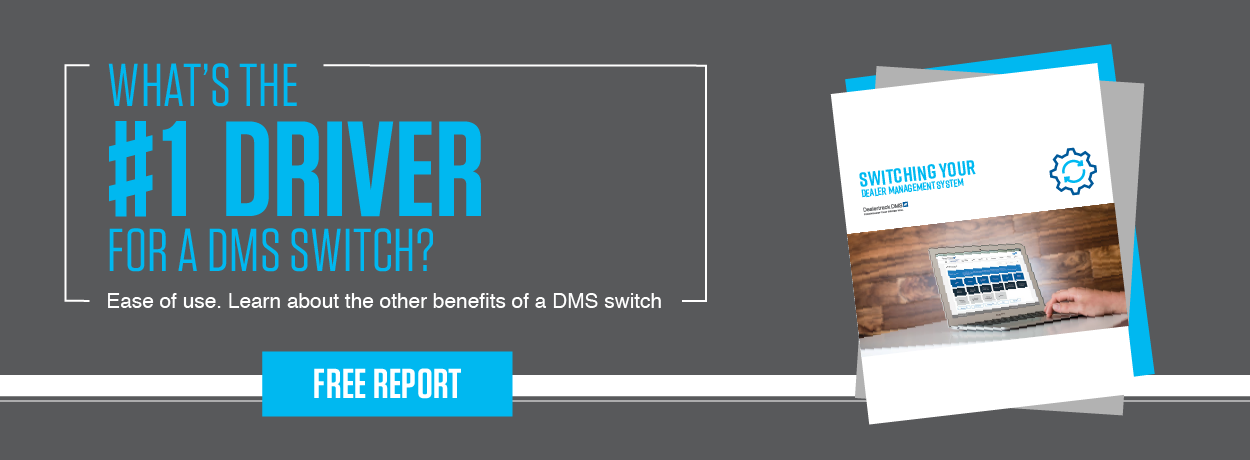
Don’t fall for a DMS that tries to sell itself on standalone features. Insist on integration. The benefits of connecting platforms are already providing many dealerships with a major competitive advantage.
Does your DMS allow all of your technology platforms to run smoothly together? If not, your DMS is probably lacking key integration capabilities–and that means your DMS is calling the shots in your dealership.
Don’t fall for a DMS that tries to sell itself on standalone features, while ignoring the importance of integration.
Of course, all software tools should be individually evaluated based on features, functionality, and capabilities. But don’t forget to look at the DMS’s ability to integrate with your other technologies. Today, everything is connected, especially in the dealership. You’re able to maintain a single data set—customer contact info, inventory data, and performance metrics—but only if they all sync across multiple software applications. Therefore, it’s absolutely crucial that your DMS easily support various technology connections and allow you to choose which connections work best for your dealership. These integrated arrangements have the potential to bring new levels of efficiency and innovation to your business.
Let’s get more specific on what we mean when technology integration is taken out of the DMS equation. Be prepared to hit the brakes on the following:
Data Ownership and Reduced Data Access Fees
Imagine the ability to use the data in your DMS any way you want to. Then stop to ask yourself why you have to imagine it! It’s your data, you own it…right? When tech integration is limited, dealerships have less control over data and inevitably pay the price.
Case in point, some of the industry’s largest DMS providers are charging third-party vendors thousands of dollars to access dealership data, claiming that those charges are necessary in order to cover the cost of securing said data. The cost might be hidden in the invoices, but trust me, they’re there. Even if they don’t show up in the invoice, they show up in the bottom line.
Monthly fees for third-party integrations can range from $200 to $800, so let’s say an average of $500. If your typical dealership uses 7 apps, that’s $3,500 a month—or $42,000 a year—out of your bottom line into the pocket of the DMS company
$500/month x 7 third-party apps x 12 months = $42,000/year
As one industry expert has observed, “the vendors [interfacing with those DMS platforms] lament that they plan to pass those extra costs on to their dealer customers. They say the costs being charged far exceed the value of any increased data security.” In other words, when ownership is taken out of the hands of the dealers, costs go up while value goes down.
Open Vendor Selection
Keep in mind that when dealerships don’t control their own data it costs them more than just money. It prevents them from using the vendors they think will be best for their businesses. When a DMS company calls the shots, it has the power to choose which vendors are allowed to integrate with its systems. Sadly, that control is being used to restrict healthy competition and to steer dealers toward solutions owned by their current DMS company.
One frustrated dealer recently wrote: “The DMS providers insist that the only way for a dealer not to experience…unfair surcharge is to utilize products that are exclusive to the DMS provider in lieu of a dealership choosing the vendor it desires. I believe that a dealership should be able to partner with the third party vendor that has the best solution to assist the dealership.”
So do we.
Seamless System Communication
While dealers shouldn’t be forced to use other products owned by their DMS providers, having the option to use in-house tools can be an advantage when it comes to integration. Several dealers have revolutionized the way they do business with the ability to integrate apps they’ve created themselves. A great example of this is Trevor Giles, Operating Partner at Motorcars Cleveland.
Most DMS providers offer other applications, including CRM, inventory, and sales tools. It’s rare, however, to find a DMS company that can serve as the hub for a full suite of capable, top-tier tools. Those that can, including Cox Automotive, offer a unique promise to provide smooth, seamless integration between their various products into the DMS. That integration translates into increased levels of efficiency for dealerships.
You should choose the technology that best fits your dealership
Don’t fall for a DMS that tries to sell itself on standalone features. Insist on integration. The benefits of connecting platforms—including data ownership, reduced data access fees, open vendor selection, and seamless software communication—are already providing many dealerships with a major competitive advantage.
For 6 critical questions for choosing the best DMS for your dealership download “Trade Up Your DMS.”

